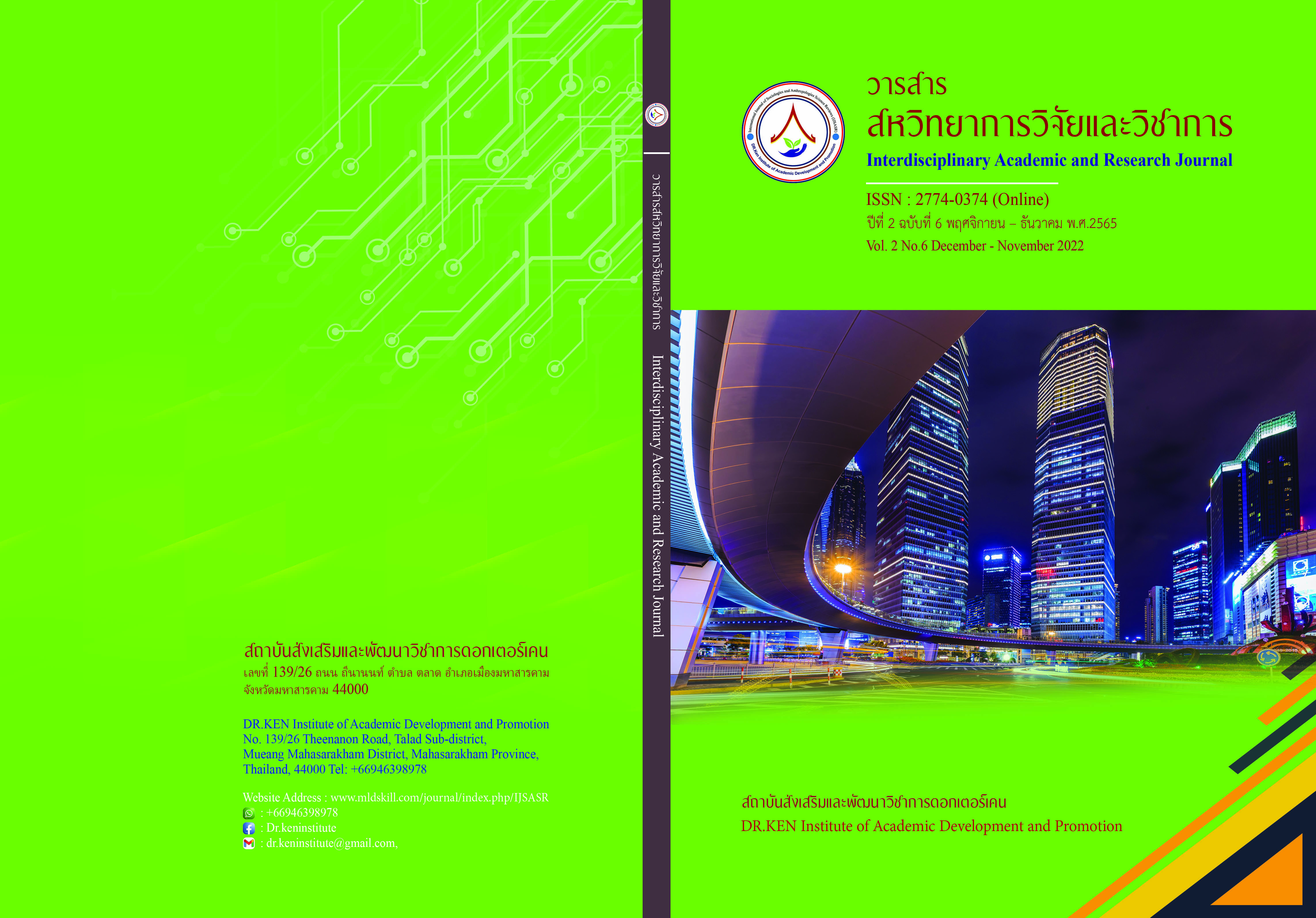Educational Management Model to Promote Life Skills Through Participation of Local
DOI:
https://doi.org/10.14456/iarj.2022.149Keywords:
Educational Management Model; , Promote Life Skills; , Participation; , Local WisdomAbstract
Management of education and learning development of learners requires cooperation with all relevant sectors to find ways to develop, prevent and solve problems for learners in the dimensions of the youth social landscape. The educational institutes, which are the main agencies in basic education planning, and providing academic services to local communities, should find ways to promote and develop learners so that they can complete their studies under the curriculum and have good self-immunity, grow into quality adults in the future by using the principles of participatory management. Thus, the objectives of this research were to 1) Study the operating conditions of education management to promote life skills with the participation of local wisdom; 2) Develop a model of education management to promote life skills with the participation of local wisdom. 3) Test the effectiveness of a model of educational management to promote life skills through the participation of local wisdom. And 4) study the effectiveness of a model of educational management to promote life skills through the participation of local wisdom The target group was 77 teachers and students obtained by purposive selection. The research tools were interview forms, questionnaires, and model assessments. and the statistics used in the research were mean and standard deviation. The results of the research were as follows: (1) The level of the educational management operation to promote life skills with the participation of local wisdom with the highest overall average was that educational institutions encouraged teachers to use local wisdom in learning management. It is training, seminars, and study visits for teachers. accounted for 91 percent, followed by educational institutions stipulating activities to develop student life skills that must be modified under the context of students and the locality, namely drug avoidance activities Occupational promotion activities accounted for 83%, and occupations using local wisdom were the sufficiency agriculture, accounting for 82 percent, respectively. (2) Educational management model to promote life skills through the participation of local wisdom It was found that the model structure consisted of principles, objectives, essence, and elements. The components are divided into 2 areas, namely, participatory education management, and learning management. (3) The experimental results of using the model of education management to promote life skills with the participation of local wisdom revealed that participatory education management as a whole was at the highest level, and In terms of overall learning management, it was found that at the highest level. And (4) The effectiveness of the educational management model for promoting life skills through the participation of local wisdom was consistent and suitable for continuous development. The appropriateness index was 1.00.
References
กระทรวงมหาดไทย. (2560). โรงเรียนพอเพียงท้องถิ่น. กรุงเทพฯ: กระทรวงมหาดไทย.
กระทรวงศึกษาธิการ. (2551). แนวทางการจัดการเรียนรู้ตามหลักสูตรแกนกลางการศึกษาขั้นพื้นฐานพุทธศักราช 2551. กรุงเทพฯ: คุรุสภาลาดพร้าว.
จิตตวดี ทองทั่ว. (2554). การพัฒนารูปแบบการมีส่วนร่วมของชุมชนสำหรับจัดกิจกรรมการศึกษาตลอดชีวิตในสถานศึกษา : การวิจัยเชิงปฏิบัติการแบบมีส่วนร่วม. (วิทยานิพนธ์ปริญญาดุษฎีบัณฑิต. กรุงเทพฯ: จุฬาลงกรณ์มหาวิทยาลัย.
ธนพัชร แก้วปฏิมา. (2547). การพัฒนารูปแบบวัดทักษะชีวิตสำหรับนักเรียนชั้นประถมศึกษาปีที่ 4-6 วิทยานิพนธ์ปริญญาศิลปศาสตรมหาบัณฑิต. กรุงเทพฯ: มหาวิทยาลัยเกษตรศาสตร์.
บุญชม ศรีสะอาด. (2554). สถิติวิจัยการศึกษา. กรุงเทพฯ: เนติกุล.
ประหยัด สุขสำราญ. (2556). รูปแบบการบริหารแบบมีส่วนร่วมในการจัดทำหลักสูตรสถานศึกษาขั้นพื้นฐาน (วิทยานิพนธ์ปริญญาครุศาสตรดุษฎีบัณฑิต). อุบลราชธานี: มหาวิทยาลัยราชภัฏอุบลราชธานี.
ไพโรจน์ พรหมมีเนตร. (2552). รูปแบบการพัฒนาภาวะผู้นําทางการศึกษาตามหลักพุทธธรรม (วิทยานิพนธ์ปริญญาดุษฎีบัณฑิต) พิษณุโลก : มหาวิทยาลัยนเรศวร.
กรมกิจการเด็กและเยาวชน. (2558). รายงานการพัฒนาเด็กและเยาวชนประจำปี 2557. กรมกิจการเด็กและเยาวชน กระทรวงการพัฒนาสังคมและความมั่นคงของมนุษย์
เมตต์ เมตต์การุณ์จิต. (2547). การบริหารจัดการศึกษาแบบมีส่วนร่วม. กรุงเทพฯ: บุ๊คพอยท์.
วีรศักดิ์ เลียบสื่อตระกูล. (2548). รูปแบบกิจกรรมส่งเสริมอาชีพอิสระเพื่อการมีรายได้ระหว่างเรียนในโรงเรียนมัธยมศึกษา กรมสามัญศึกษา จังหวัดชัยนาท (วิทยานิพนธ์ปริญญาครุศาสตรมหาบัณฑิต). นครสวรรค์: มหาวิทยาลัยราชภัฏนครสวรรค์.
สมปอง มาตย์แท่น. (2555). การพัฒนาแนวทางการบริหารจัดการการพัฒนาผู้เรียนตามหลักปรัชญาของเศรษฐกิจพอเพียง โรงเรียนสังกัดเทศบาลเมืองมหาสารคาม จังหวัดมหาสารคาม (วิทยานิพนธ์ปริญญาครุศาสตรดุษฎีบัณฑิต). มหาสารคาม: มหาวิทยาลัยราชภัฏมหาสารคาม.
สมพงษ์ ลอยลม. (2547). การนำภูมิปัญญาท้องถิ่นสู่การพัฒนาหลักสูตรสถานศึกษาของโรงเรียนประถมศึกษา อำเภอหนองม่วง จังหวัดแพร่. วิทยานิพนธ์ปริญญาการศึกษามหาบัณฑิต : สถาบันราชภัฏอุตรดิตถ์.
สำนักงานเขตพื้นที่การศึกษาประถมศึกษา มหาสารคาม เขต 2. (2563). ข้อมูลบุคลากรของสำนักงานเขตพื้นที่การศึกษาประถมศึกษา มหาสารคาม เขต 2. มหาสารคาม : สำนักงานเขตพื้นที่การศึกษาประถมศึกษา มหาสารคาม เขต 2.
สำนักงานคณะกรรมการพัฒนาการเศรษฐกิจและสังคมแห่งชาติ. (2559). สรุปสาระสำคัญแผนพัฒนา เศรษฐกิจและสังคมแห่งชาติ ฉบับที่ 12 พ.ศ. 2560-2564. กรุงเทพฯ: สำนักงาน คณะกรรมการพัฒนาเศรษฐกิจและสังคมแห่งชาติสำนักนายกรัฐมนตรี.
สำนักงานคณะกรรมการพัฒนาการเศรษฐกิจและสังคมแห่งชาติ. (2560). แผนพัฒนาเศรษฐกิจและสังคมแห่งชาติ ฉบับที่ 12. กรุงเทพฯ : ผู้แต่ง.
Downloads
Published
How to Cite
Issue
Section
License
Copyright (c) 2022 Chakkrit Leelasakulphak, Nattachai Chantachum, Pongtorn Popoonsak

This work is licensed under a Creative Commons Attribution-NonCommercial-NoDerivatives 4.0 International License.
Copyright on any article in the Interdisciplinary Academic and Research Journal is retained by the author(s) under the under the Creative Commons Attribution-NonCommercial-NoDerivatives 4.0 International License. Permission to use text, content, images, etc. of publication. Any user to read, download, copy, distribute, print, search, or link to the full texts of articles, crawl them for indexing, pass them as data to software, or use them for any other lawful purpose. But do not use it for commercial use or with the intent to benefit any business.
















.png)


